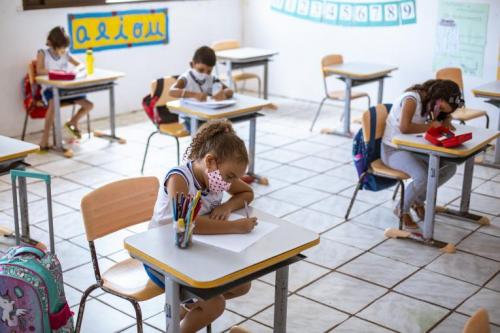Around 2 in 3 children are still out of the classroom in Latin America and the Caribbean
UNICEF urges countries in the region to scale up the return to in-person learning
A year and a half into the pandemic, about 86 million children remain out of the classroom in Latin America and the Caribbean, according to the latest UNICEF estimates.

Laura, 6, sits in a classroom on her first day back to in-person classes since the beginning of the COVID-19 pandemic in the municipality of Serrinha, in the northeastern state of Rio Grande do Norte, Brazil.
However, at least 47 million children have resumed in-person learning across the region thanks to the recent efforts of several countries to accelerate school reopening, either partially or totally.
“For the past 18 months, most children in Latin America and the Caribbean haven’t seen their teachers or friends outside of a screen. Those without internet haven’t seen them at all,” said Jean Gough, UNICEF Regional Director for Latin America and the Caribbean. “Digital education should continue and improve, but it’s clear that during the pandemic the most marginalized families haven’t had access to learning. Every day out of the classroom brings the most vulnerable children closer to dropout, gang violence, abuse or human trafficking.”
School is not only a place where children learn but also a safe space for them to interact, play and grow together. During the pandemic, Latin America and the Caribbean has had longer uninterrupted school closures than in any other region in the world. Across the region, 153 in-person school days have been lost on average since the pandemic hit. The widespread school closures have caused the largest disruption of learning in the region’s modern history.
The latest evidence from around the world shows that schools are not associated with increased transmission of COVID-19, but rather reflect the level of community transmission. Even in places with the highest COVID-19 rates, the World Health Organization recommends considering all options to continue in-person learning.
UNICEF, along with UNESCO and the World Food Programme, have developed regional guidelines for ministries of education and for school administrators and principals to prevent the spread of COVID-19 at school. To help keep students and teachers safe, governments must implement prevention measures, including physical distancing and provision of soap, clean water and, where appropriate, protective equipment.
“It’s hopeful to see that every day more schools are reopening and more children and teachers are going back to school in Latin America and the Caribbean,” said Jean Gough. “More and more countries in the region are proving that in-person learning is possible; others must urgently bring their children back into the classroom. The risks of staying out of school are too high, higher than the risks of being in school. Children in this region have already lost more than a year of school. They can’t afford to miss another day of in-person learning.”
To support school reopening in Latin America and the Caribbean, UNICEF has worked with countries to develop back-to-school strategies, deliver education and hygiene supplies, and provide psychosocial support to students and teachers.
UNICEF urges governments to open all schools as soon as possible. Together with the World Bank and UNESCO, UNICEF is calling for:
● Targeted programmes to bring all children and youth back in school where they can access tailored services to meet their learning, health, psychosocial well-being, and other needs;
● Effective remedial learning to help students catch up on lost learning;
● Support for teachers to address learning losses and incorporate digital technology into their teaching.
Source: United Nations International Children's Education Fund
- 476 reads
Human Rights
Fostering a More Humane World: The 28th Eurasian Economic Summi

Conscience, Hope, and Action: Keys to Global Peace and Sustainability

Ringing FOWPAL’s Peace Bell for the World:Nobel Peace Prize Laureates’ Visions and Actions

Protecting the World’s Cultural Diversity for a Sustainable Future

Puppet Show I International Friendship Day 2020

